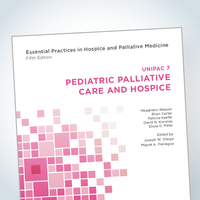Submitted by Angie Forbes on
This book is designed to acquaint healthcare practitioners with a base of knowledge and a defined set of skills to care for children with life-threatening conditions. Topics include the differences between adult and pediatric palliative care, communication techniques, barriers to providing palliative care, and more. The contents are not meant to be a full treatise on pediatric palliative care, but rather to highlight the unique features of this population and this care dynamic.
Upon completion of this self-study program the learner should be better able to
- define pediatric palliative care (PPC) and related concepts, including patient demographics and hospice eligibility criteria
- identify similarities and differences between adult palliative care and PPC
- identify barriers to providing comprehensive palliative care for pediatric patients from the time of diagnosis of a life-threatening condition and strategies to circumvent those barriers
- use effective communication techniques when discussing palliative care, chronic conditions, terminal illness, and death with children and their families
- recognize anticipatory, normal, and pathologic grief and initiate effective interventions to help families through their bereavement
- initiate effective management of psychological issues, including practical concerns, related to children with life-threatening conditions
- identify and explain ethical and legal issues related to palliative care for pediatric patients
- assess pain in pediatric patients
- manage pain and opioid-related side effects in pediatric patients
- assess and manage nonpain symptoms in pediatric patients
- assess and manage refractory symptoms in pediatric patients
- anticipate and manage the physical, psychosocial, and spiritual suffering surrounding a child's death.
Authors:
Meaghann Weaver, MD MPH
Brian Carter, MD
Patricia Keefer, MD
David N. Korones, MD FAAHPM
Elissa G. Miller, MD
No CME credits available
Member Price: $65
List Price: $85

